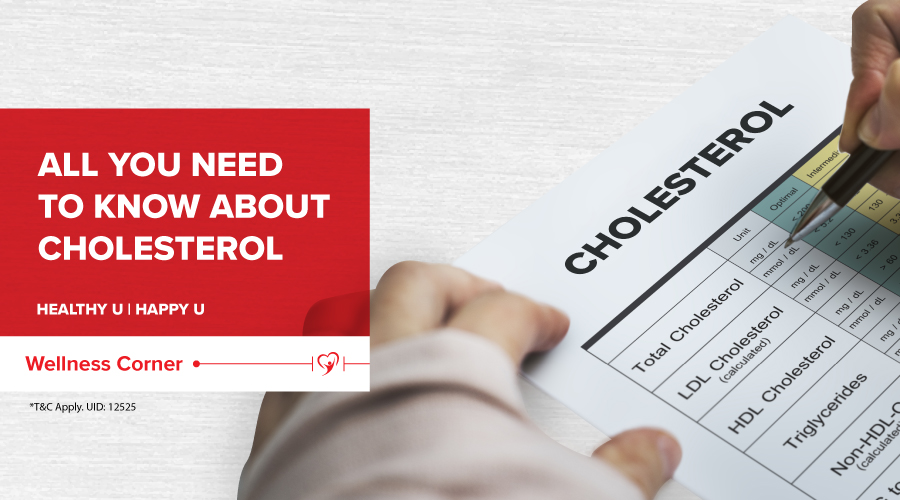

What is Cholesterol?
- Overview
- Types
- Causes
- Symptoms
- Recommended Levels
- Risk Factors
- Treatment
- Complications
- Prevention Tips
- Conclusion
- FAQs
Overview
Cholesterol is a wax-like substance which is made in the liver. Through blood it is carried to all cells of the body. Cholesterol is important for good health as it is an important constituent of cells, tissues, hormones and other vital components of the body. However, high cholesterol level leads to thickening of cell walls & tissues resulting in reduced blood flow to vital body organs. This can cause mild to severe heart conditions and other ailments.
Types of Cholesterol
Low-density lipoprotein (LDL), and High-density lipoprotein (HDL) are the two main types of cholesterol found in the human body. Former is referred to ‘good’ cholesterol whereas latter is referred to ‘bad’ cholesterol.
Low-density lipoprotein (LDL)
LDL is often referred to as bad cholesterol. Excess of LDL cholesterol in your blood significantly increases the risk of heart disease. This is because high LDL levels can cause the narrowing of the arteries which then obstructs the normal flow of blood. This blockage in the normal flow of blood to the heart can even lead to a heart attack. If the blood flow to the brain is blocked, then it can lead to a stroke.
High-density lipoprotein (HDL)
HDL is also known as good cholesterol as it helps in cutting or negating the harmful effects of High LDL levels. Apart from these, there are Triglycerides which is essentially a type of fat and may increase the risk of heart disease, if available in high levels. Then there is Very low-density lipoprotein (VLDL). Like LDL this is another type of ‘bad’ cholesterol.
Causes of High Cholesterol
The most common cause of high cholesterol is an unhealthy lifestyle. This can include:
- Unhealthy eating habits which includes eating food items high in saturated and trans fat, which can raise LDL (bad) cholesterol levels.
- Lack of physical activity, with little or no exercise which lowers HDL (good) cholesterol level.
- Smoking. This which lowers HDL cholesterol, especially in women and also raises LDL cholesterol levels.
- Genetics may also cause people to have high cholesterol.
Symptoms of High Cholesterol
Though high cholesterol has no symptoms and a blood test is the only way to detect if you have it, there are a few warning signs which you should never ignore.
- Feeling bloated and experiencing digestive issues
- Bad breath due to poor digestion
- Unusual swelling and numbness in your body
- Chest pain is the most important and noticed symptoms which results because of blood circulation getting affected due to high cholesterol which gives pressure on the arteries.
- Experiencing frequent and unusual headache and nausea.
- Feeling excess fatigue, tiredness & sleepy.
- Difficulty in breathing.
- Weak eyesight
Recommended Total Cholesterol Level
Total cholesterol level is the overall amount of cholesterol found in your blood. It consists of:
- Low-density lipoproteins (LDLs)
- High-density lipoproteins (HDLs)
- Triglycerides
Total Cholesterol Level
- Less than 200mg/dL: Desirable
- 200-239 mg/dL: Borderline High
- 240 mg/dL and above: High
Recommended total cholesterol levels for children is under 170 mg/dL.
LDL (Bad) Cholesterol Level
- Less than 100mg/dL: Optimal
- 100-129mg/dL: Near Optimal/ above optimal
- 130-159mg/dL: Borderline High
- 160-189mg/dL: High
- 190mg/dL: Very High
HDL (Good) Cholesterol Level
- Less than 40mg/dL: A major risk factor for heart disease
- 40-59mg/dL: The higher, the better
- 60mg/dL and higher: Considered protective against heart disease
Women typically need more HDL (good cholesterol) than men. As we age, cholesterol levels tend to rise and men are generally at a higher risk of developing higher cholesterol. However, a woman’s risk goes up after she enters menopause.
Risk Factors of High Cholesterol
Factors that can increase your risk of unhealthy cholesterol levels include:
- Poor diet - Eating too much saturated fat or trans fats can result in unhealthy cholesterol levels. Saturated fats are found in fatty cuts of meat and full-fat dairy products. Trans fats are often found in packaged snacks or desserts.
- Obesity - Having a body mass index (BMI) of 30 or greater puts you at risk of high cholesterol.
- Lack of exercise - Exercise helps boost your body's HDL, the "good," cholesterol.
- Smoking - Cigarette smoking may lower your level of HDL, the "good," cholesterol.
- Alcohol - Drinking too much alcohol can increase your total cholesterol level.
- Age - Even young children can have unhealthy cholesterol, but it's much more common in people over 40. As you age, your liver becomes less able to remove LDL cholesterol.
Treatment of High Cholesterol
Following and incorporating health lifestyle changes such as exercising and eating a healthy diet are the first line of treatment against high cholesterol. But, even after making these changes your cholesterol levels remain high, then your doctor might recommend you certain medications. The choice of medication or combination of it depends on various factors, including your personal risk factors, your age, your health and possible drug side effects. Common choices include:
- Statins - Statins block a substance needed to make cholesterol which causes the liver to remove cholesterol from your blood.
- Cholesterol absorption inhibitors - These drugs help to reduce blood cholesterol by limiting the absorption of dietary cholesterol.
- Bempedoic acid - This newer drug works in much the same way as statins but is less likely to cause muscle pain.
- Bile-acid-binding resins - These drugs lower cholesterol indirectly by binding to bile acids, a substance needed for digestion. This prompts the liver to use excess cholesterol to make more bile acids, which reduces the level of cholesterol in blood.
Tolerance of medications varies from person to person. The common side effects of statins are muscle pains and muscle damage, reversible memory loss and confusion, and elevated blood sugar. Before prescribing cholesterol medications, your doctor might recommend liver function tests to monitor the medication's effect on your liver.
Complications of High Cholesterol
High cholesterol can cause a dangerous accumulation of cholesterol and other deposits on the walls of your arteries (atherosclerosis). These deposits (plaques) can reduce blood flow through your arteries, which can cause complications, such as:
- Chest pain. If the arteries that supply your heart with blood (coronary arteries) are affected, you might have chest pain (angina) and other symptoms of coronary artery disease.
- Heart attack. If plaques tear or rupture, a blood clot can form at the plaque-rupture site — blocking the flow of blood or breaking free and plugging an artery downstream. If blood flow to part of your heart stops, you'll have a heart attack.
- Stroke. Similar to a heart attack, a stroke occurs when a blood clot blocks blood flow to part of your brain.
Tips to Prevent High Cholesterol
The same heart-healthy lifestyle changes that can lower your cholesterol can help prevent you from having high cholesterol in the first place. To help prevent high cholesterol, you can:
- Eat a low-salt diet that emphasizes fruits, vegetables and whole grains
- Limit the amount of animal fats and use good fats in moderation
- Lose extra pounds and maintain a healthy weight
- Quit smoking
- Exercise on most days of the week for at least 30 minutes
- Drink alcohol in moderation, if at all
- Manage stress
Conclusion
Cholesterol is a waxy, fat-like substance in your blood. Cholesterol is essential for good health and it’s not inherently “bad”. It is needed by the body to build cells and make vitamins and other hormones. But too much bad type of cholesterol can pose a problem and put you at a higher risk of heart disease or stroke. It’s important to check your cholesterol to make sure you’re at a healthy level.
Frequently Asked Questions
1. Are fruits good for Cholesterol?
Fruits are highly recommended for people suffering from cholesterol related issues. Due to the high fiber content fruits help lower cholesterol levels in the body. This is in the form of getting rid of some of the excess cholesterol and also restrict the extra production of cholesterol in the liver.
2. Is exercise good for controlling cholesterol?
Exercise is known to produce higher levels of HDL, which is the ‘good’ cholesterol and helps offset the adverse effects of LDL. Exercising also helps reduce triglyceride levels and maintain the optimal weight, both of which are very important for controlling cholesterol.
3. Can cholesterol issues be cured?
The answer to this depends on the severity of the high condition. However, several studies report that with the combination of a healthy diet, regular exercising, and adjustments to lifestyle the cholesterol levels can be brought back to control. In case this does not work, it is time to consult your doctor who may prescribe some medicines as an extra form of help.
4. Does being overweight lead to cholesterol issues?
While high cholesterol can affect people of any weight, the risks are considerably higher in the case of overweight people. This is largely due to the fact that extra weight and added fat can greatly increase LDL cholesterol levels while reducing the HDL levels. This causes a complete cholesterol imbalance in the blood and can lead to a variety of chronic ailments.
Source: Harvard Health, Medline Plus, Righthomeremedies, Healthline, Mayoclinic, National Institute of Health, MedicineNet, Heart.org
Get a right Health Insurance today & protect your savings from unexpected medical expenses.
Cholesterol is essential for good health. However, there are 2 types of cholesterol - good and bad cholesterol. Naturally, if there is too much bad cholesterol, health issues can increase leading to complications or hospitalisation.
Get
health insurance to keep yourself financially secure during such a crisis.
Disclaimer: This blog provides general information and discussions about health and related subjects. The information and other content provided in this blog, website or in any linked materials are not intended and should not be considered, or used as a substitute for, medical advice, diagnosis or treatment. Kindly contact your Doctor before starting a new medicine or health regime.

/diabetes_s.jpg?sfvrsn=27944770_2)
/cholesterol-s.png?sfvrsn=2cb77395_2)
/myocardial-infarction-s.jpg?sfvrsn=c30af9c0_2)
/cancer-w.png?sfvrsn=b00ce94_2)
/obesity_s.jpg?sfvrsn=41f27b41_2)












 Health Insurance
Health Insurance  Travel Insurance
Travel Insurance  Car Insurance
Car Insurance  Cyber Insurance
Cyber Insurance  Critical Illness Insurance
Critical Illness Insurance
 Pet Insurance
Pet Insurance
 Bike/Two Wheeler Insurance
Bike/Two Wheeler Insurance  Home Insurance
Home Insurance  Third Party Vehicle Ins.
Third Party Vehicle Ins.  Tractor Insurance
Tractor Insurance  Goods Carrying Vehicle Ins.
Goods Carrying Vehicle Ins.  Passenger Carrying Vehicle Ins.
Passenger Carrying Vehicle Ins.  Compulsory Personal Accident Insurance
Compulsory Personal Accident Insurance  Travel Insurance
Travel Insurance  Rural
Rural 










